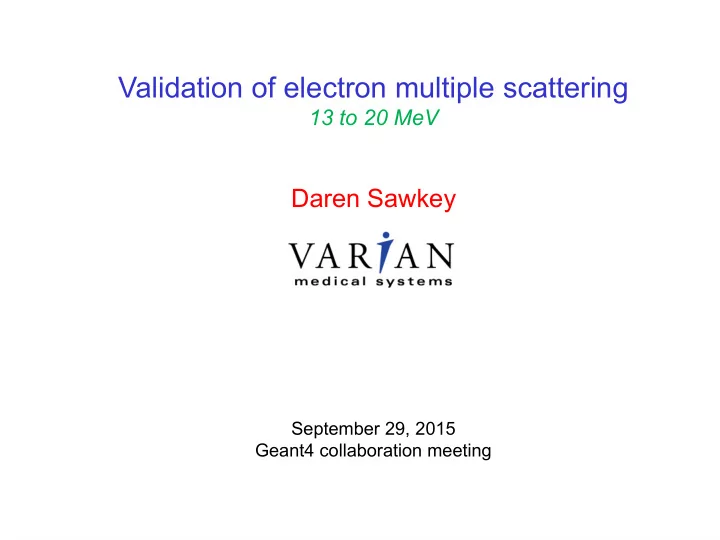

Validation of electron multiple scattering 13 to 20 MeV Daren Sawkey September 29, 2015 Geant4 collaboration meeting
Experiment: Ross et al., Med. Phys. 35 , 4121 (2008) 7 materials, various thickness, 13 and 20 MeV Simulation: electronScattering2 example
1. Width of Gaussian fit to central part 2. Overall goodness of fit
Improvements : • Use physics lists from Geant4 source rather than local • same # of incident particles for each physics list (previously SS was 10%) • calculation of p-value • Include simulation, measurement uncertainties in chi-squared Simulation uncertainty : Measurement uncertainty : 1% in width—what is it for each data point? determine empirically
Examples Width good, chi-sq good
Examples Width good, chi-sq poor
Examples Width poor, chi-sq poor
What is the uncertainty of the measured data points?
Assume 0% measurement uncertainty
Assume 1% measurement uncertainty
Assume 2% measurement uncertainty
Summarize results • Calculate average chi-square • Root-mean-square (ratio of widths – 1) • Express as % • Function of Geant4 version
ratio of widths 20 MeV
Chi-squared 20 MeV 20 MeV
p-value 20 MeV
All data vs. version: Widths 1- IDEAL
All data vs. version: chi-square IDEAL
All data vs. version: p-value
Examples of two problems found
LateralDisplacementBeyondSafety on off
Step Limit SafetyPlus Safety Boundary
TestEm5, 10 MeV e- through 10 um Cu Distance to boundary: msc limits step; strict near boundary SafetyPlus: msc doesn’t limit step in absorber.
Conclusions: Rigorous test of scattering algorithms! Good calculation of chi-square to test tails Two (3?) metrics per physics list per Geant4 version Should Chi-square, p-value, or something else be used?
Recommend
More recommend